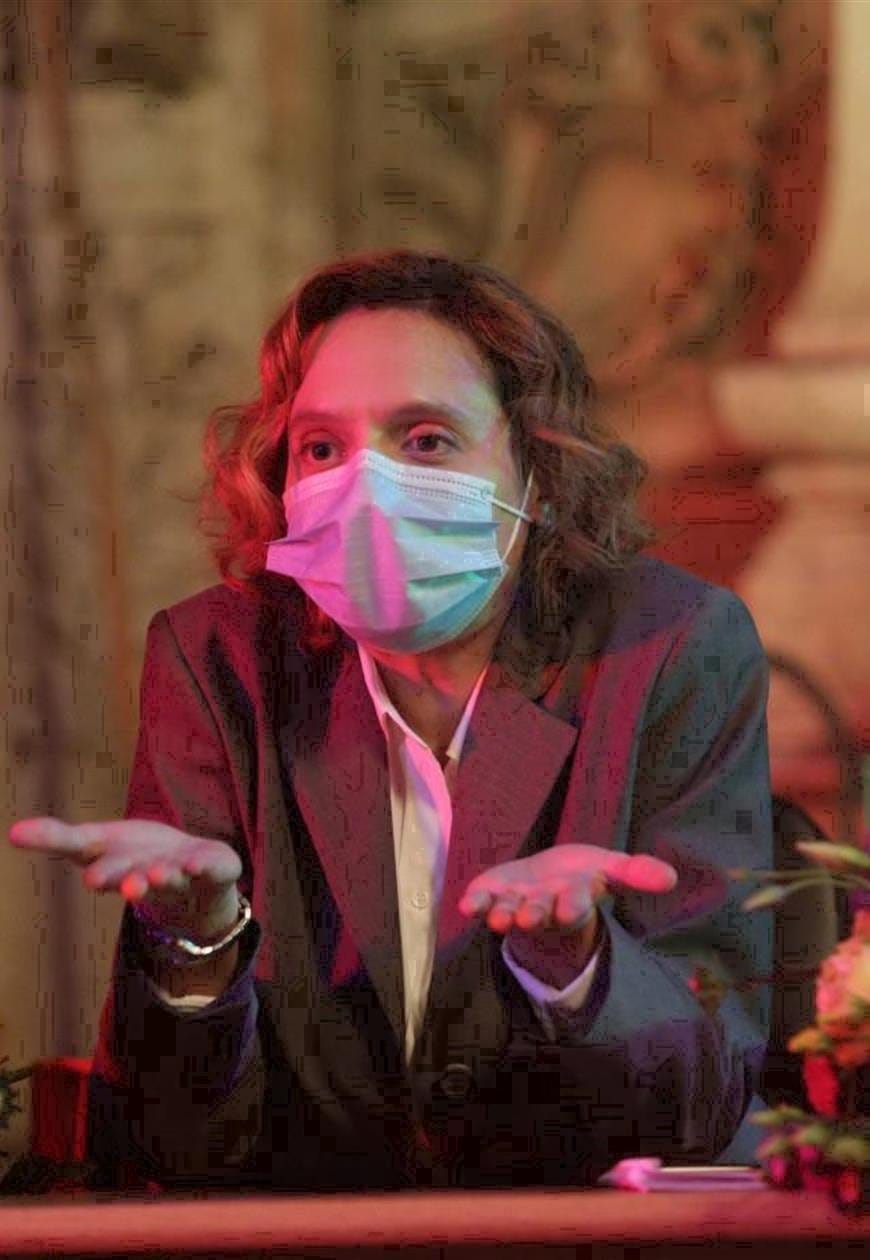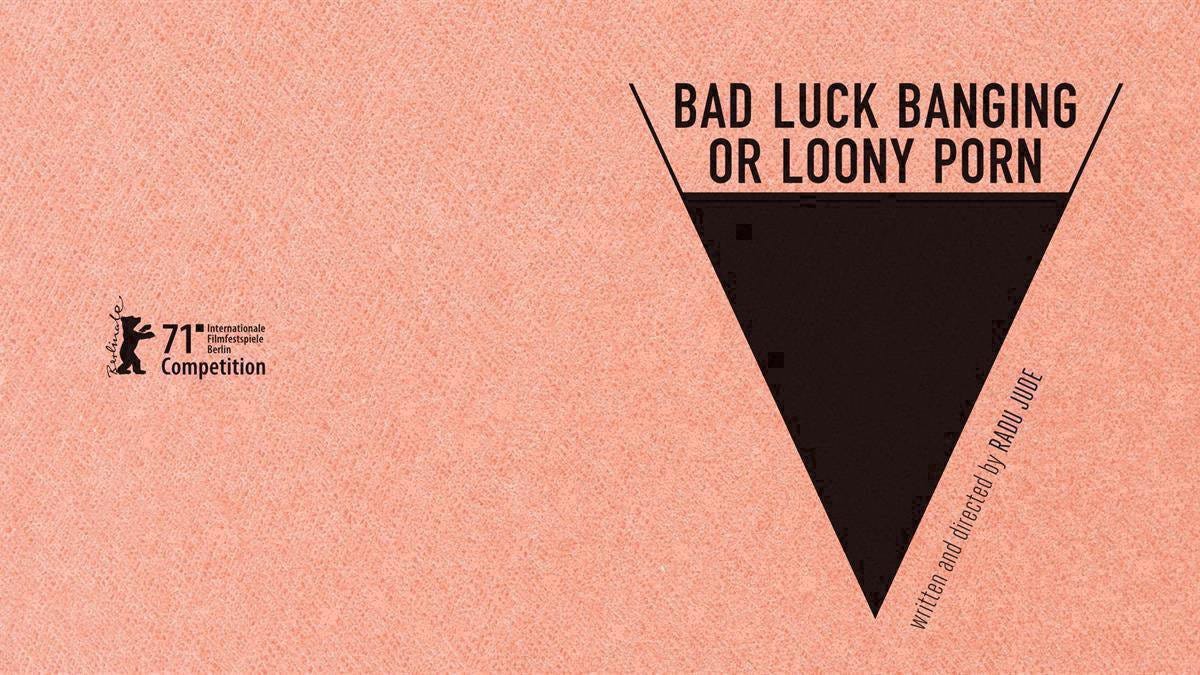Hilarious gallows humor shows the warped and cutting sense of humor and perception of humanity of Radu Jude!
Done on a shoestring budget during the time of COVID, footage often seems like a potpouri of scraps and vignettes taken as our protagonist walks through the city of Bucharest, though always with a focus on Emi, an otherwise drab schoolteacher as she goes through a day of planning how to counter the accusations which will come her way at the evening’s parents meeting.
Sound design is especially well done with the city sounds, snatches of conversation overheard and that idiot who keeps laughing and commenting throughout the parents’ meeting. It alone captures the unpleasant and yet oddly attractive atmosphere of Bucharest. Hats off to Hrvoje Radnic for sound on set, Dana Bunescu for sound design and Michel Schillings for sound mix.
Our protagonist Emi’s career and reputation are under threat after a personal sex tape is leaked on the Internet. Forced to meet the parents who are demanding her dismissal, Emi refuses to surrender to their pressure.

Radu Jude (Aferim!) delivers an incendiary mix of unconventional form, irreverent humor and scathing commentary on hypocrisy and prejudice in our societies. The forces of censure and the fascist nature of the public mob’s opinion at their root want to ban every pleasure including those which we might enjoy in our most private lives in the name of their narrowly defined “propriety”.
International distribution deals (ISA: Heretic) spiked after the film won the Golden Bear for Best Film at the 2021 Berlin International Film Festival, but producer Ada Solomon expressed concern that a U.S. deal could prove tricky as the movie contains several scenes of hard-core sex. She said in an interview that the film’s depictions of sex should be seen in context, especially given the often lax attitudes towards on-screen violence in U.S. movies. “It’s happening more and more that violence is accepted [but] nudity is not,” she said. “For me, violence affects me emotionally much more than nudity. I’m not saying we should censor this as well; we should consider [the sexual content], not through an algorithm. Things should be considered in their complexity — there is no complete black and complete white.”
The film was picked up for U.S. by the ever-brave Magnolia who will release theatrically in November.
The film was banned from public screening in Russia due to its “promotion of pornography”. However it did screen in the Moscow International Film Festival.

Radu Jude on ‘Bad Luck Banging or Loony Porn’:
Origins
The film first appeared out of long discussions with friends. On a few occasions we discussed real-life stories from Romania and other countries, of teachers being expelled from schools where they were teaching because of what they were doing in their private lives: live-cam sex chat or posting amateur porn recordings on the internet. The discussions were so heated, it made me think that although the topic seems trivial and shallow, there must be a lot more behind it if reactions to it are so powerful. Then I decided to make a film — so now I have the last word in front of my friends, they cannot come up with something like that.
The film has three parts which engage each other in poetic ways — understanding “poetic” according to Malraux’s definition: “Without doubt all true poetry is irrational in that it substitutes, for the ‘established’ relation of things, a new system of relations.”
While the film title is mostly self-explanatory, its subtitle, ‘a sketch for a popular film’, could benefit from an explanation. Malraux once noted that “Delacroix, though affirming the superiority of the finished painting over the sketch, kept many of his sketches, whose quality as works of art he considered equal to that of his best paintings.” The idea struck me as relevant and I decided to apply it in filmmaking and try to see what a film would look like if its form was left open, unfinished, like a sketch. And yes, “popular”, since I believe the film could be easy like a summer breeze and because of its tabloid-like topic. But it is not a real popular film. Only a sketch of a possible one.
Shooting in COVID Times
The first lockdown ended in Romania at the end of May and we were supposed to film in October and November. When we saw that the second wave of Covid-19 was coming (at the beginning of July), me and the producer Ada Solomon had to decide: either we stick to the plan (which meant also applying for extra funding), with the risk of postponing the shooting in case the crisis worsens, or we film sooner with the money we have. We opted for the latter and started to prepare the film. The number of cases was rising, so I had also to decide how to interact with people. I strongly believe that, as a director, you have a certain responsibility towards the cast and crew.
When I was young, I really admired all the crazy shoots I read about: Way Down East, Aguirre, Apocalypse Now etc. I still admire them, but I am too weak: I try not to risk the life or health of anybody when it comes to shooting. I don’t think any film in the world is worth someone contracting even a common cold, and my bad films — even less. With these in mind, I did all the casting, and all the rehearsals on Zoom and decided to have the crew wearing masks. And also, even the cast. Firstly, because the film was supposed to be contemporary and the masks were part of our daily life and I wanted to capture this moment, to find the anthropological aspect of the mask-wearing. Secondly, because I cared about the health of the people involved. You know, many of them are in the film at my invitation. I was the host and I felt responsible. Most of the people agreed with these safety regulations. Some of them, more vulnerable, agreed to do the film only because I promised them that the rules of social distancing and protection will be severely respected. We all tested for Covid-19 before shooting and two times more.
If you went down on the street during this time, the signs that remained — posters for concerts, empty restaurants, and so on and so forth — were already signs of a non-existent reality. Cinema has this possibility to capture things, to capture the signs of the time passing, to make a capsule of the moment in many ways.
In the first shooting day, Ada Solomon, our producer, explained to everyone that wearing the mask is mandatory on set for the whole film, that we must change it every 4 hours (they were provided free by the production), that we have only sandwiches as catering (for obvious reasons). Everybody (literally: everybody) agreed. And most of us respected the rules, although it was exhausting, and wearing a mask in severe heat for 12 hours a day can be horrible. Then, there were some crew or cast members sometimes not respecting the rules, which made our shoot more challenging than it could have been. I am not against people who break the rules, on the contrary, if it involves only their bodies. I am against breaking the rules when you endanger or harm others. The great thing on a film set (or on my sets, anyway) is that everyone has the same rights as everyone else: the same working hours (apart from special situations, like a more time-consuming make-up etc.), the same food, the same accommodation or transport. So, it was quite disappointing to have a few people every day taking off the mask whenever they could. I see it as a lack of respect for their colleagues, a kind of “Fuck you, I don’t care about anyone else, I want to feel good even if I can infect you.” This sometimes made the atmosphere on the set tense, but that’s it. I felt relieved when the shooting ended, and we were all healthy.
Themes
What is obscene and how do we define it? We are used to acts which are much more obscene, in a way, than small acts like the one that set off the uproar we see in the film.
This was my idea — to clash these two types of obscenity, and to see that the one so-called obscenity in the porn video is nothing compared with what is around us, but that we don’t pay attention to.
The film tells a contemporary story, a small one, a little story. If history and politics are part of the film, that is because the story itself has a deeper meaning if we see it in a historical, societal and political context.
Obscenity is the theme of this film and the viewers are constantly invited to compare the so- called obscenity of a banal amateur porn video with the obscenity around us and the obscenity we can find in recent history, whose traces are all around. So, the viewers should make this montage operation. Georges Didi Huberman wrote something very important regarding montage and it could apply to our film as well:
“Le montage sera précisément l’une des réponses fondamentales à ce problème de construction de l’historicité. Parce qu’il n’est pas orienté simplement, le montage échappe aux théologies, rend visibles les survivances, les anachronismes, les rencontres de temporalités contradictoires qui affectent chaque objet, chaque événement, chaque personne, chaque geste. Alors, l’historien renonce à raconter ‘une histoire’ mais, ce faisant, il réussit à montrer que l’histoire ne va pas sans toutes les compléxités du temps, toutes les strates de l’archéologie, tous les pointillés du destin.” *
* “Montage will be precisely one of the fundamental responses to this problem of constructing historicity. Because it is not oriented towards simplicity, Montage escapes theologies, and has the power to make visible the legacies, anachronisms, contradictory intersections of temporalities that affect each object, each event, each person, each movement. Thus, the historian renounces telling ‘a story’, but in doing so, succeeds in showing that history cannot be, without all of the complexities of time, all the archaeological strata, all of the perforated fragments of destiny.”
ABOUT THE FILMMAKER
Radu Jude is a Romanian director and screenwriter. He studied filmmaking in Bucharest and started his career as an assistant director. In 2006, he made the short film The Tube with a Hat, winner of more than 50 international awards. Jude’s feature debut The Happiest Girl in the World (2009) was selected for more than 50 international film festivals. Titles such as Aferim!, Scarred Hearts and Everybody in Our Family followed and won multiple awards: Silver Bear for Best Director in Berlinale 2015, Special Jury Prize in Locarno 2016 and an EFA nomination for Best Scriptwriter. The international premiere of The Dead Nation in Locarno 2017 marked his debut in documentary film. “I Do Not Care If We Go Down in History as Barbarians” (2018) won the Crystal Globe for Best Film and Label Europa Cinema Prize in Karlovy Vary in 2018. His latest films, Uppercase Print and The Exit of the Trains (co-directed with Adrian Cioflâncă), premiered in Berlinale Forum 2020.
The Exit of the Trains was a long, non-narrated documentary on the horrendous treatment of the Jews in Romania at the hands of the Romanians under the various dictators of its recent past, from the Germans to the Russians and the pograms before.
Cast | Katia Pascariu (Emi), Claudia Ieremia (The Headmistress), Olimpia Mălai (Mrs. Lucia), Nicodim Ungureanu (Lt. Gheorghescu), Alexandru Potocean (Marius Buzdrugovici), Andi Vasluianu (Mr. Otopeanu) Produced by | microFILM Romania
Co-produced by | Paul Thiltges Distributions (Luxembourg), endorfilm (Czech Republic), Kinorama (Croatia)
In association with | Bord Cadre Films (Switzerland), Sovereign Films (UK)
Producers | Ada Solomon
Co-producers | Paul Thiltges, Adrien Chef, Jiří Konečný, Ankica Jurić Tilić Associate Producers | Dan Wechsler, Jamal Zeinal-Zade, Andreas Roald Countries of production | Romania, Luxembourg, Czech Republic, Croatia Cinematography | Marius Panduru, RSC
Editing | Cătălin Cristuțiu
Production design | Cristian Niculescu
Costumes | Cireșica Cuciuc
Make-up | Bianca Boeroiu
Music | Jura Ferina, Pavao Miholjević
Assistant director | Isabela von Tent
Sound | Hrvoje Radnic (sound on set), Dana Bunescu (sound design)
Sound mix | Michel Schillings
Line producer |Valentino Rudolf
VFX | Raoul Nadalet, Espera Production
Comedy — Completed 2021
Berlinale — Berlin IFF 2021 Competition Winner of Golden Bear for Best Film, San Sebastian FF 2021, Busan IFF 202
International sales agent Heretic licensed rights to Argentina’s Zeta, Australia’s Potential, Austria’s Panda Lichspiele, Benelux’s September, Brazil’s Imovision, Germany’s Neue Visionen, Greece’s Cinobo, Iceland’s Bio Paradis, Israel’s Lev/ Shani, Japan’s Twin, Norway’s AS Fidalgo, Poland’s New Horizons, Portugal’s Films4You, Romania’s Micro Multilateral, Serbia’s MCF Megacom, Sweden’s Njutafilms, Switzerland’s Xenix, Taiwan’s Swallow Wings, U.K.’s Sovereign, U.S.’s Magnolia
Radu Jude is a Romanian film director and screenwriter. In 2003, he graduated from the Media University of Bucharest (Film Directing Department). Jude worked as an assistant director on Amen. (2002), directed by Costa-Gavras, and The Death of Mr. Lazarescu(2005), directed by Cristi Puiu. He directed several award-winning short films, among them The Tube with a Hat (2006) — the most successful Romanian short film ever, winner of Grand prizes at Sundance, San Francisco, Los Angeles, Grimstad, Hamburg, Bilbao, Huesca, Trieste, Montpellier, Cottbus, Aspen, IndieLisboa, Brussels, Mediawave, Kraków, Almería, Valencia, Uppsala and many more. Other shorts were selected by top festivals, including Clermont-Ferrand, San Francisco, Cottbus and Oberhausen, where Radu Jude won the Grand Prix. Jude directed over 100 advertising commercials. The Happiest Girl in the World (2009), his feature film debut, won the CICAE Prize at the Berlin International Film Festival, the FIRESCI Prize at the Sofia International Film Festival, the Prize for Best Screenplay at the Bucharest International Film Festival and the FIPRESCI Prize at IndieLisboa. The film was selected in the ACID Programme at 2009 Cannes Film Festival. Everybody in Our Family (2012) received the ‘Heart of Sarajevo’ Award and the Bayard d’Or in Namur, among other awards. Radu Jude’s acclaimed historical drama Aferim!(2015) premiered at the 65th Berlin International Film Festival where he won the Silver Bear award as ‘Best Director’.
- IMDb Mini Biography By: Cristian Avram





No comments:
Post a Comment